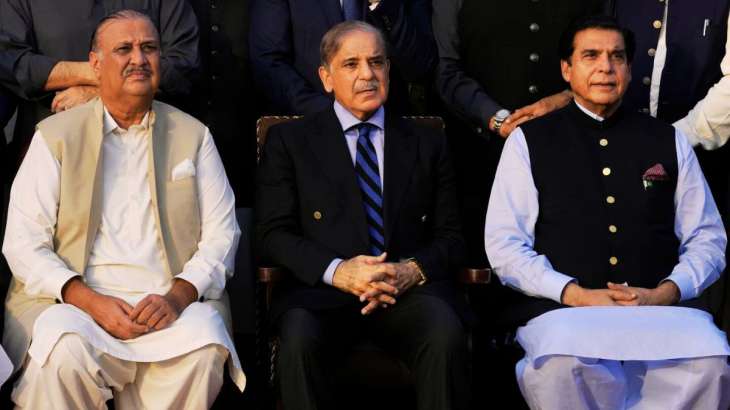
[ad_1]

Pakistan’s President dissolved the National Assembly– a first step in the countdown to a general election by mid-November. Notably, the critical development from the cash-strapped nation came at a time when the main opposition leader Imran Khan was fighting to overturn a corruption conviction that landed him in a high-security prison over the weekend.
Although the National Assembly was dissolved as per the constitution, a statement from President Arif Alvi’s office said that he acted upon the instructions from outgoing Prime Minister Shehbaz Sharif. It was dissolved three days prior to the completion five-year term.
This paved the path for forming an interim government and general elections that would typically have to be held within 90 days. But this year there’s a twist. A delay until the spring is possible if Pakistan’s election commission opts for redistricting ahead of an election, based on the results of a recent census.
The uncertainty over the election date coincides with the legal and political drama surrounding Sharif’s predecessor Khan. The 70-year-old popular opposition leader was convicted by an Islamabad court on Saturday of concealing assets and was sentenced to three years in prison.
The commission last year disqualified Khan from holding public office for five years, accusing him of unlawfully selling state gifts and concealing assets as premier. Khan was notified of his disqualification again on Tuesday, following his sentencing.
Khan, who was ousted in a no-confidence vote in April 2022 but remains a popular figure in the country, has denied the charges.
Meanwhile, Sharif addressed his last Cabinet meeting Wednesday. He said he had faced multiple challenges, including the country’s worst economic crisis and devastating floods which killed 1,739 people and caused $30 billion in damage in Pakistan last summer.
Amid this chaotic situation, the country will choose a caretaker Prime Minister until the upcoming general elections. Although there were no official announcements from President Alvi, he could name Jalil Abbas Jilani as the new interim Prime Minister, a former Pakistani Ambassador to Germany and High Commissioner to India, Abdul Basit, has claimed.
How does Pakistan appoint a caretaker PM?
According to the Pakistan constitution, soon after the dissolution of the National Assembly, a process to appoint a caretaker prime minister will begin under Article 224-A of the Constitution. PM Shehbaz and Leader of the Opposition in the National Assembly Raja Riaz will hold consultations to finalise the name of the interim prime minister.
If they fail to agree on a name, the Prime Minister and the Opposition leader will forward their names to a bipartisan committee to zero in on one name within a given time period. If the committee also fails, the Election Commission of Pakistan receives the same names and chooses one of them to serve as Prime Minister. The caretaker Prime Minister appoints a Cabinet to manage the government’s activities, and he leaves office as soon as the newly elected Prime Minister takes the oath of office.
Requirements of a caretaker government
A caretaker government, by Pakistani law, is tasked to oversee day-to-day matters important to the government but is not allowed to make major policy decisions except for urgent matters. A caretaker government is also supposed to restrict itself to routine, non-controversial, and reversible matters.
A caretaker Prime Minister is expected to be an impartial person towards any person or political party. However, in some cases, it has been found that caretaker governments have overstepped their boundaries, such as in 2013, where all appointments, transfers, and holdings by the interim authority were revoked by the Supreme Court.
Pakistan general elections
Notably, the Pakistan National Assembly has 342 seats– 272 of which are directly elected, 60 are reserved for women, and ten for religious minorities. According to the country’s constitution, at least 70 seats reserved for women and religious minorities are allocated to the political parties as per their proportional representation.
Sharif’s ruling Pakistan Muslim League party (PML-N) is expected to face tough competition from Khan’s party– though Khan himself would be unable to take part unless his conviction is overturned. Under Pakistan’s laws, no one with a criminal conviction can lead a party, run in elections, or hold public office.
[ad_2]
Source link